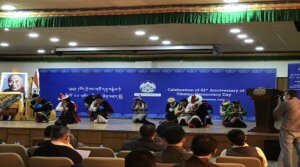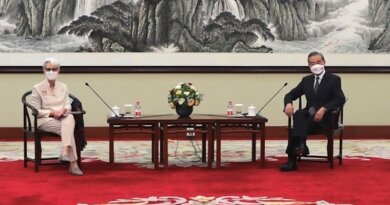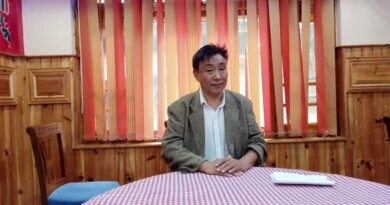Inability of parliament to convene session preventing Kashag from carrying out legislative functions says CTA President on 61st Tibetan Democracy day

DHARAMSALA, 2 Sept: The President of the Central Tibetan Administration(CTA) said that “the inability of the parliament to convene its session has been preventing Kashag from carrying out its legislative functions as the CTA marked the 61st Tibetan Democracy day without the Tibetan parliament.
“The present Kashag has been carrying out its administrative works without any negligence. However, the inability of the parliament to convene its session has been preventing it from carrying out its legislative functions. The parliament is also not able to make use of the opportunities to plan activities and campaigns in accordance with the changing situation in China and the international community,” CTA’s President Penpa Tsering said.
President Tsering made the remarks while delivering the statement of the Kashag at the official celebration of the 61st anniversary of Tibetan Democracy. The official celebration was held at the Sikyong auditorium of the CTA at its headquarters here in Gangchen Kyishong for the second year in a row as the world continues to battle Wuhan, China originated COVID-19 pandemic and the restrictions in place due to the pandemic.
He further stated that “the Kashag has been informed of several instances of the Chinese government exploiting this issue to spread falsehood inside Tibet, create division in the exile Tibetan community and misuse it at the international platforms. It has created great concern and apprehension among the governments, parliaments and Tibet supporters who genuinely support us.”
“Tibetans inside Tibet said they would stop their activities for the Tibetan cause if the problem is not resolved immediately,” he added.
He also spoke on Tibetan democracy from the nascent stages in the 1960s to His Holiness the Dalai Lama declaring on Aug 8, 2011, the fulfilment of the ‘long-cherished goal’ of bringing democracy to the Tibetan people when he devolved all his political authority to the democratically elected leader.
“Because of the far-reaching vision of His Holiness, today the Tibetan administration in exile represents all the Tibetan religious faiths and has jurisdiction not only over areas administered by the Gaden Phodrang government but also the whole of Tibet’s three traditional provinces of U-Tsang, Kham and Amdo. This unprecedented consciousness among the Tibetans in exile of belonging to a single Tibetan nationality could also be considered as a fruit of His Holiness the Dalai Lama’s democratisation efforts,” he added.
Cultural performances were presented during the event and winners of coveted Sikyong Award for Academic Accomplishment, Gandhen Phodrang scholarships, class 10 Sikyong Excellence award, Sikyong Professional Scholarship award and CTA Award to Distinctive Staff for 25 years’ service and winners were presented with their awards, certificates and cash prizes.
The event also saw the CTA President inaugurate the Tibetan Institute of Performing Arts (TIPA)’s Yarkyi 2021 music album while a speech on the importance of strengthening Tibetan democratic institutions by the Dalai Lama delivered on 31 Aug 2010 before the Tibetan General Meeting was also screened at the ceremony.
On 2 September 1960, the first Commission of Tibetan People’s Deputies from religious and provincial constituencies took their oath before His Holiness the Dalai Lama, thereby, formally inaugurating the Tibetan democratic system of governance.
The Dalai Lama devolved all his political authority to a democratically elected leader despite the impassioned appeals by the Parliament and the Tibetan people to stay on as the nominal head of state in 2011, thereby completing the transition to a secular democracy. This year marks over 10 years since the devolution of political authority by His Holiness.
This year there is no official statement from the Tibetan parliament as the CTA is yet to come to terms with the constitutional crises that rocket it. The CTA has been functioning without a parliament since the inauguration of Sikyong Penpa Tsering.
The standing committee members of the 16th Tibetan parliament has to dissolve as all but 3 resigned on 27 May after the Sikyong took the oath of office from Dagpo Sonam Norbu, the Chief Justice Commissioner of the CTA who was impeached by the parliament along with the two Justice Commissioners.
Earlier on 8th June, the members of the 17th TPIE took their oath of office in an unprecedented manner but couldn’t elect a new Speaker and Deputy Speaker of the house.
Twenty-one MPs took their oath of office from the pro-tem Speaker Dawa Tsering who was administered the oath by the Chief Justice Commissioner who was removed by the TPIE in March while 22 MPs who held it unlawful took their oath in front of the Charter and a portrait of His Holiness the Dalai Lama.
The unprecedented manner in which the members of the 17th TPIE took the oath of office was necessitated after the Chief Justice Commissioner and the two Justice Commissioners of the Tibetan Supreme Justice Commission impeached by the Tibetan parliament in March performed a u-turn and announced their resumption to offices nearly two months after accepting their impeachment though they called it illegitimate.
If the political deadlock keeps dragging beyond the September session, then without the parliament and its approval to the budget for the next fiscal year, this could force the CTA to completely shut down.





